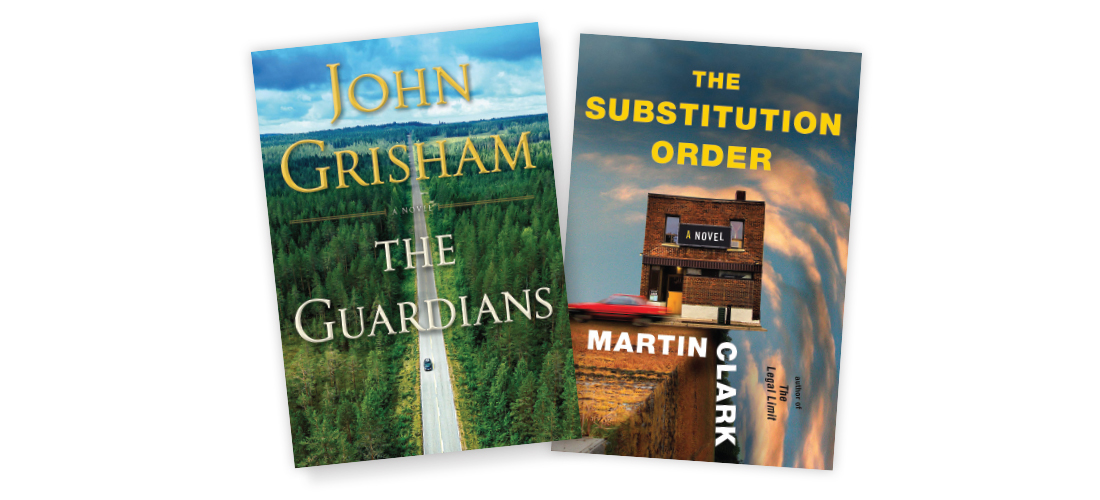
Crime and Punishment
Doing justice to a pair of new legal thrillers
By D.G. Martin
Two popular authors of legal thrillers have close connections to North Carolina. We would like to claim them for our state, but both live in Virginia.
John Grisham’s latest book, The Guardians, has spent recent weeks on or near the top of The New York Times best-seller list. Although he lives near Charlottesville, he regularly visits his daughter’s family in Raleigh and enjoys his second home in Chapel Hill, where his wife, Renee, is active in support of the UNC Press and the performing arts efforts.
Martin Clark, author of his fifth novel, The Substitution Order, though not as well known as Grisham, has legions of fans. He has been called “the thinking man’s John Grisham.”
Clark lives on a farm near Stuart, Virginia, just a few miles above the North Carolina line and not far from the Winston-Salem hospital where he was born.
Both new books feature hardworking, smart lawyers confronting sophisticated corruption schemes in the justice system.
Grisham’s story features innocent people who have been convicted and sentenced to lengthy years of confinement. Coincidently, newspapers and movie theaters have been full of real life stories of long-serving prisoners who have been found to be innocent.
“After 36 Years in Prison, 3 Men Cleared in Killing,” a headline in The New York Times proclaimed recently. Stories like it have become more and more common as efforts to establish the innocence of people convicted of murder expand throughout the country, including North Carolina.
Last year Charles Ray Finch, 81, was freed after being wrongfully convicted 43 years ago of a murder in Wilson County. His release came after a 17-year effort by students in the Duke Law Innocence Project.
Why does it take such a long time to undo a wrongful conviction?
Grisham gives an answer in The Guardians. His hero is Cullen Post, a lawyer and Episcopal priest who works for Guardian Ministries in Savannah, Georgia. Post lives in a small apartment above the ministries’ office, but spends most of his time on the road, visiting prisoners all over the Southeast.
Post interviews prospective clients in their prison cells. Most of the time he concludes they are guilty. But for those who have persuaded him of their innocence, he gives his all. He even sits with them as they await execution, sharing their last meal. With others, he tries to unearth facts and connections that might bolster their innocence claims. Back at the office, he helps draft legal documents to persuade courts to open the door for a review of their clients’ convictions. Even after all this hard work the Guardian Ministries has only gained the release of eight innocent prisoners.
Grisham paints the portraits of several imprisoned clients who are almost certainly innocent but focuses on an African-American former truck driver, Quincy Miller. Twenty-two years earlier Miller had been convicted of murdering Keith Russo, a small town white lawyer who had done a lousy job representing Miller in an acrimonious divorce. The evidence against Miller was thin and contrived, but the local sheriff was determined to pin the murder on him.
Why was the sheriff so motivated? Post’s probing is, at first, inconclusive. Then, as he learns that drug dealing might be involved and that the murdered Keith Russo was involved in the illicit trade, things get scary.
Post meets Miller’s original defense lawyer and learns that a drug cartel had subjected him to torture and terror so frightening that he would not speak of Miller’s case in public. When Miller is attacked and almost killed by prisoners on the drug cartel’s payroll and strange men begin to follow Post, Grisham injects his patented skillful storytelling to weave a disturbing tale.
While Post makes it clear that his job is to prove that his clients, in this case Miller, are innocent, and not necessarily to find the actual murderers, after all Grisham reveals about the horror of the drug cartels and the local officials involved in Keith Russo’s murder, it disappointed this reader not to have the real trigger man and his handlers brought to justice.
Maybe Grisham is just leaving the door open for a sequel. If so, I will be in line to buy the first copy.
Meanwhile, there is time to enjoy Clark’s The Substitution Order, which has gained widespread praise. New York Times reviewer Alafair Burke wrote, “In a good legal thriller, the law itself propels the narrative as intensely as any single character. By that definition, Martin Clark’s ‘The Substitution Order’ is not merely a good legal thriller; it’s a great one.”
It opens with its main character and narrator speaking, “For years, I was an excellent lawyer, as honest and effective as you could ever want, and I’m a decent enough person, and despite my mistakes, which — I concede — were hellacious, I deserve better than this misery.” These words introduce us to the plight of Kevin Moore.
When a lawyer’s life collapses, it can fall hard, and the devastation can be horrendous. But hard times can make for a good story, and Moore’s sad situation becomes the basis for Clark’s enticing book.
Moore was an admired and successful lawyer in Roanoke, Virginia. He was deeply devoted to his wife, but then briefly fell into a short fling of infidelity, drug use and association with drug dealers.
The results: disbarment and probation. His wife gives up and leaves him. Hoping to regain respectability and return to a good life, Moore takes a job working in a cheap deli. His circumstances make him the target of sophisticated crooks. A stranger who calls himself Caleb visits the deli and proposes that Moore cooperate in a multi-million-dollar scam to con his malpractice insurer out of millions of dollars. As a part of the scam, Moore would admit that he failed to follow up on a client’s option to purchase a parcel of mountain land for a little less than a million dollars. She lost the property, which later sold for $6 million.
If Moore plays along, his lawyers’ malpractice insurer will pay $5 million to his former client, who is part of the scam.
When Moore turns Caleb and his colleagues down, they use a corrupt law enforcement official to get a fake positive drug test and plant drugs and a pistol in his car. The resulting probation violation and new charges could put him in jail for a long time.
His Job-like experience continues when he suffers a stroke just as his soon-to-be ex-wife takes him off her health insurance coverage. His slow turnaround begins when he calls Dan Duggan, his Davidson College classmate and law school roommate at the University of Virginia, for help. Duggan guides him through the health insurance morass and then, at the end of the book, plays a key role in Moore’s counter-scam to punish Caleb’s colleagues and deny them the fruits of their evil deeds.
Martin Clark, the author of this compelling story, recently retired as a Virginia circuit court judge, giving him, we can hope, time to write more “thinking man’s” thrillers. OH
D.G. Martin hosts North Carolina Bookwatch Sunday at 11 a.m. and Tuesday at 5 p.m. on UNC-TV. The program also airs on the North Carolina Channel Tuesday at 8 p.m. To view prior programs go to http://video.unctv.org/show/nc-bookwatch/episodes/.30





